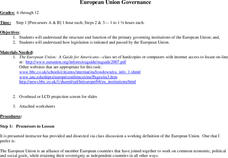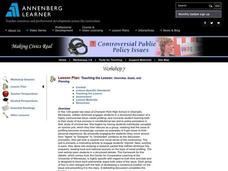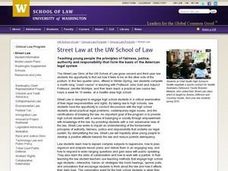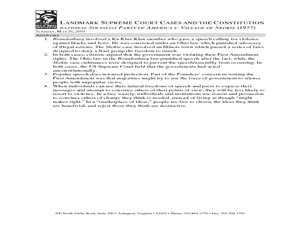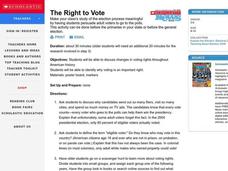Curated OER
European Union Governance
Young scholars explore the government functions of the European Union and how legislation is passed. As a class, students define the European Union and their interests in economic, political and social issues. Using the internet, young...
Curated OER
How to Write a Bill
High schoolers view video excerpts from, "Mr. Smith Goes to Washington" and discuss them to brainstorm how to write a bill. They divide into two groups representing senate committees to participate in a mark-up session where they read...
Curated OER
Voting and the U.S. Constitution (Past, Present, and Future), Part 2
Students analyze and discuss the 19th Amendment, and read the document, Why Women Want to Vote. Students illustrate statements from the handbill, then conduct a play about women's suffrage.
Curated OER
Racial Profiling
Learners debate both positions on the controversial topic of racial profiling with support for each and then develop a consensus position on how racial profiling as a law enforcement tool should be used.
Curated OER
Legally Wed
Students explore the controversial topic of same-sex marriages in a fishbowl discussion. They write balanced news articles based on interviews exploring people's opinions on laws that define marriage.
Curated OER
Right of Privacy: 4th Amendment
Learners are introduced to the 4th Amendment of the Washington state Constitution. In groups, they examine the Constitution of the state of Washington and compare it to the United States Constitution. They role play the role Supreme...
Curated OER
Individual Rights and Liberties: Free Speech
Students review free speech laws and the First Amendment in the Constitution. They discuss a current event involving free speech. They present the information to the class.
Curated OER
Landmark Supreme Court Cases and the Constitution: Reynolds v. United States (1878)
Students examine the impact of court decisions. In this Supreme Court instructional activity, students read the Reynolds v. United States (1878) case study regarding first election decided by the House of Representatives. Students...
Curated OER
Constitutions and Mindmap of Government
In this European Union studies worksheet, learners examine governments in the United Kingdom and other European nations as they respond to 10 short answer questions and complete a graphic organizer.
Curated OER
Presidents and the Constitution: George W. Bush and the Case of Bush v. Gore (2000)
Students examine the impact of court decisions. In this Supreme Court lesson, students read the Bush v. Gore case study regarding the presidential election of 2000. Students take notes on the case and respond to discussion questions...
Curated OER
Private Matters
Students examine the intersection between an individual's right to privacy versus the public's right to know, through the lens of the relationship between public figure Gary Condit and missing intern Chandra Levy.
Curated OER
Comparison of Political Ideologies in the Context of Constitutional Preambles
Pupils examine the various philosophies that form the foundations of political systems of major world countries.
Curated OER
War and International Law America’s Foreign Policy: Military Intervention
Students analyze America's foreign policy. For this military intervention lesson, students listen to their instructor present a lecture on U.S. military interventions since 1989. Students respond to discussion questions about the lecture.
Curated OER
Landmark Supreme Court Cases and the Constitution: National Socialist Party of America v. Village of Skokie (1977)
Students examine the impact of court decisions. For this Supreme Court lesson, students read the National Socialist Party of America v. Village of Skokie (1977) case study regarding First Amendment Rights. Students take notes on the case...
Curated OER
Enforcers of the Law, The Executive Branch
Fourth graders explore the executive branch of government; in particular, Florida's executive branch of government.
Curated OER
The Right to Vote
In this voting worksheet, students identify and discuss changes in voting rights throughout American history.
Then, they identify why voting is an important right for Americans. Finally, students create voting bookmarks instead of or in...
Curated OER
Labor and Law: Sit-Down Strikes
Students analyze the work of auto industry labor unions. In this labor unions lesson plan, students listen to their instructor present a lecture on the details of various sit-down strikes. Students respond to discussion questions...
Curated OER
Flag Wars
Young scholars consider how zoning policy shapes the character of neigborhoods. They see how zoning and loan policies have been used historically in the U.S. to benefit some people and discriminate against others. They examine tensions...
Curated OER
War and International Law:America’s Foreign Policy: A Brief History
Pupils discover the history of American foreign policy. In this foreign policy lesson, students listen to their instructor present a lecture that presents a brief history of American foreign policy. Pupils respond to discussion questions...
Deliberating in a Democracy
Surveillance
Big Brother is always watching you! Scholars analyze the impact security cameras have on the legal system in a democracy. Primary documentation, case studies, and video clips investigate the use of video in prosecution and provide an...
K12 Reader
What is a Tribal Government?
What is life like on a Native American reservation? Learn about the ways a tribal government works with a reading comprehension activity. After reading a short passage, kids use context clues to answer five comprehension questions.
K12 Reader
Responsibilities of Citizenship
Your pupils are all citizens of your classroom. Provide some more instruction on how people can be citizens with the reading passage included here. After reading, learners answer the five related questions.
National Endowment for the Humanities
George Washington: The Precedent President
Everyone knows that George Washington was the first president, but do your scholars know why that was so important? The lesson plan, the third in a sequence of three, allows learners to understand how George Washington set a precedent...
C-SPAN
14th Amendment Equal Protection Clause
Two Supreme Court cases, Plessy v. Ferguson and Brown v. Board of Education take center stage in a lesson about the Equal Protection Clause of the 14th Amendment. Class members research both cases to compare and contrast the rulings.
Other popular searches
- Constitutional Law Games
- Discuss Constitutional Law
- Constitutional Law Privacy
- Constitutional Law Jeopardy
- Constitutional Law Lessons
- Constitutional Law Cruel
- Constitutional Law Syllabus


